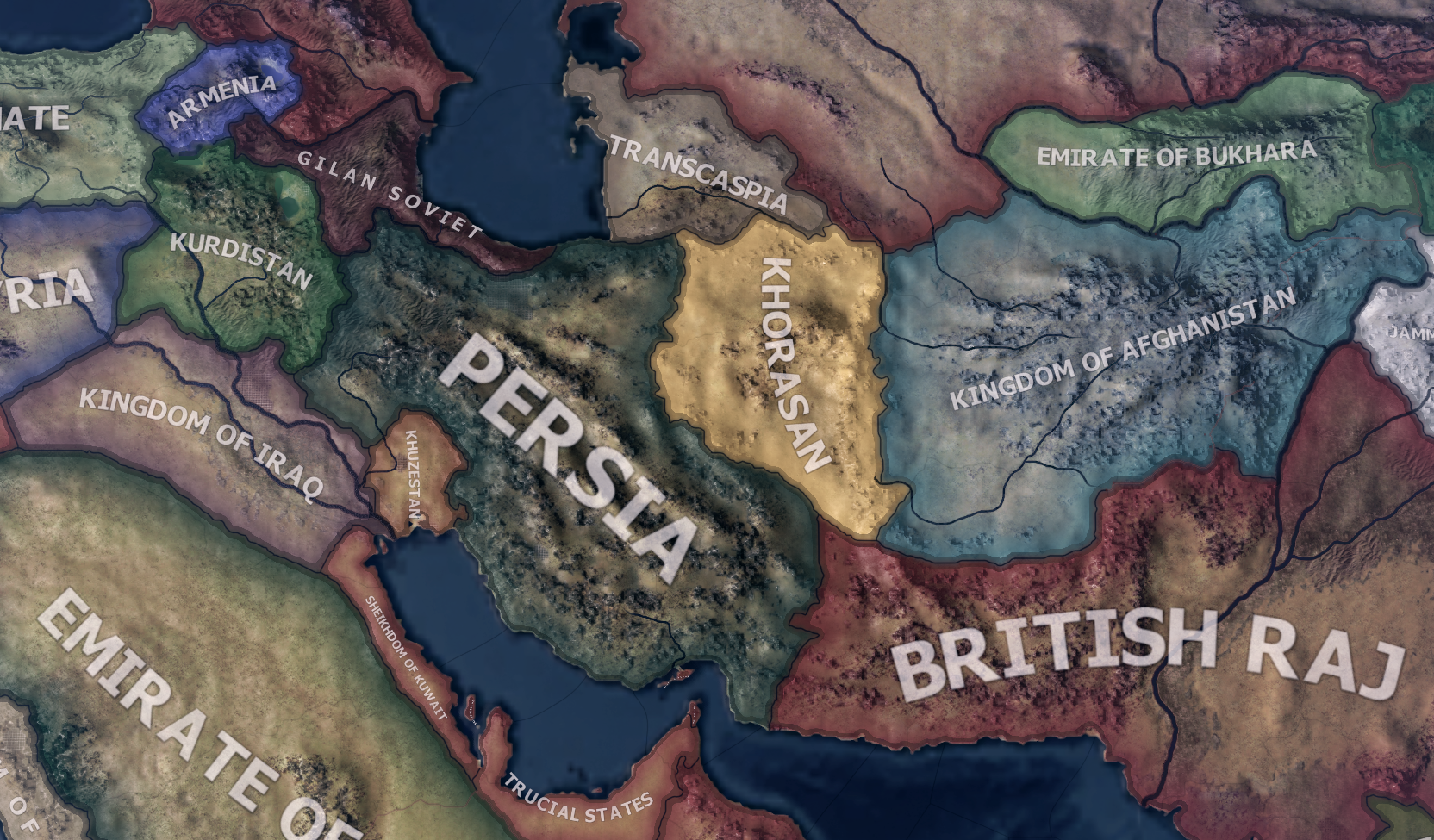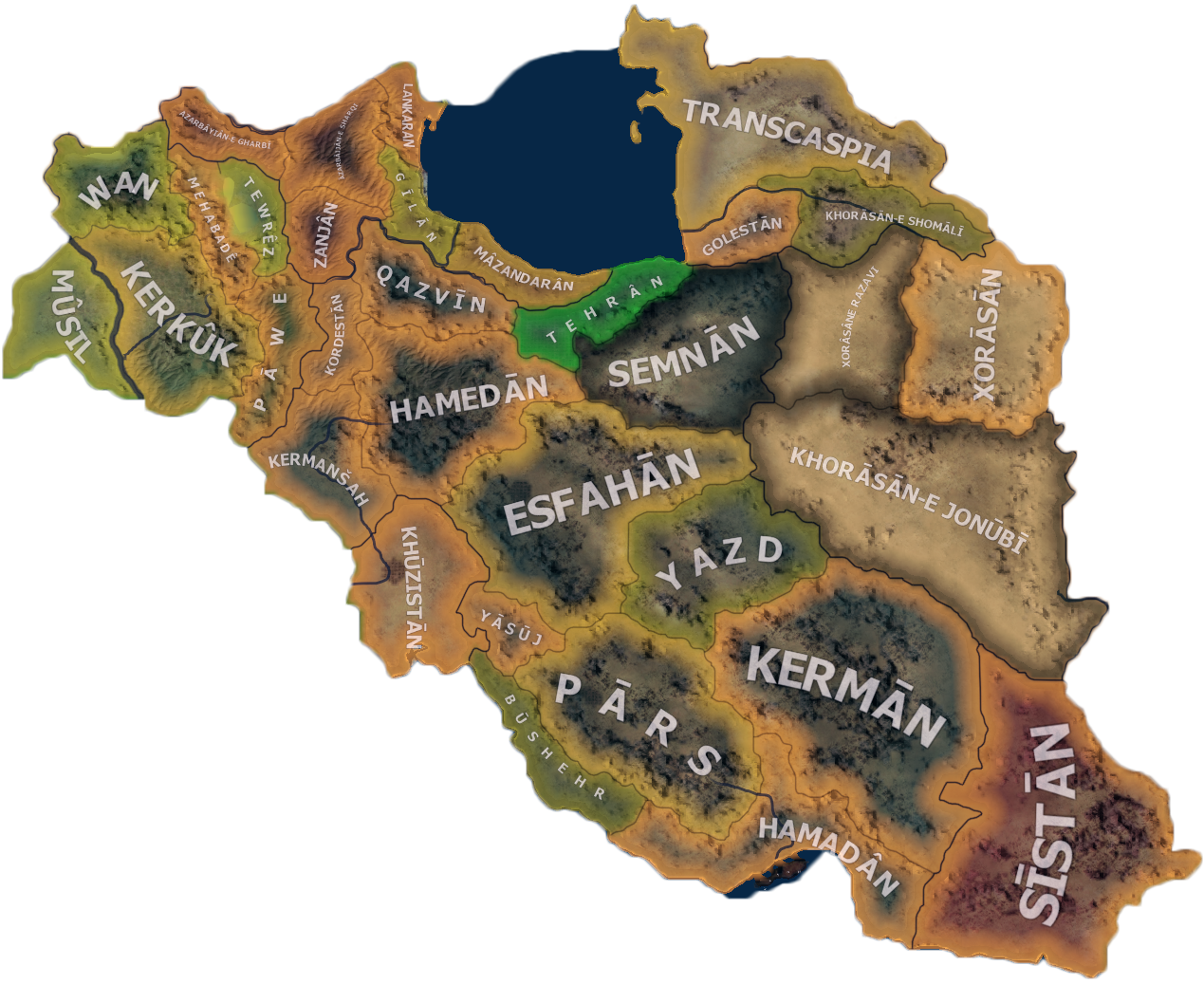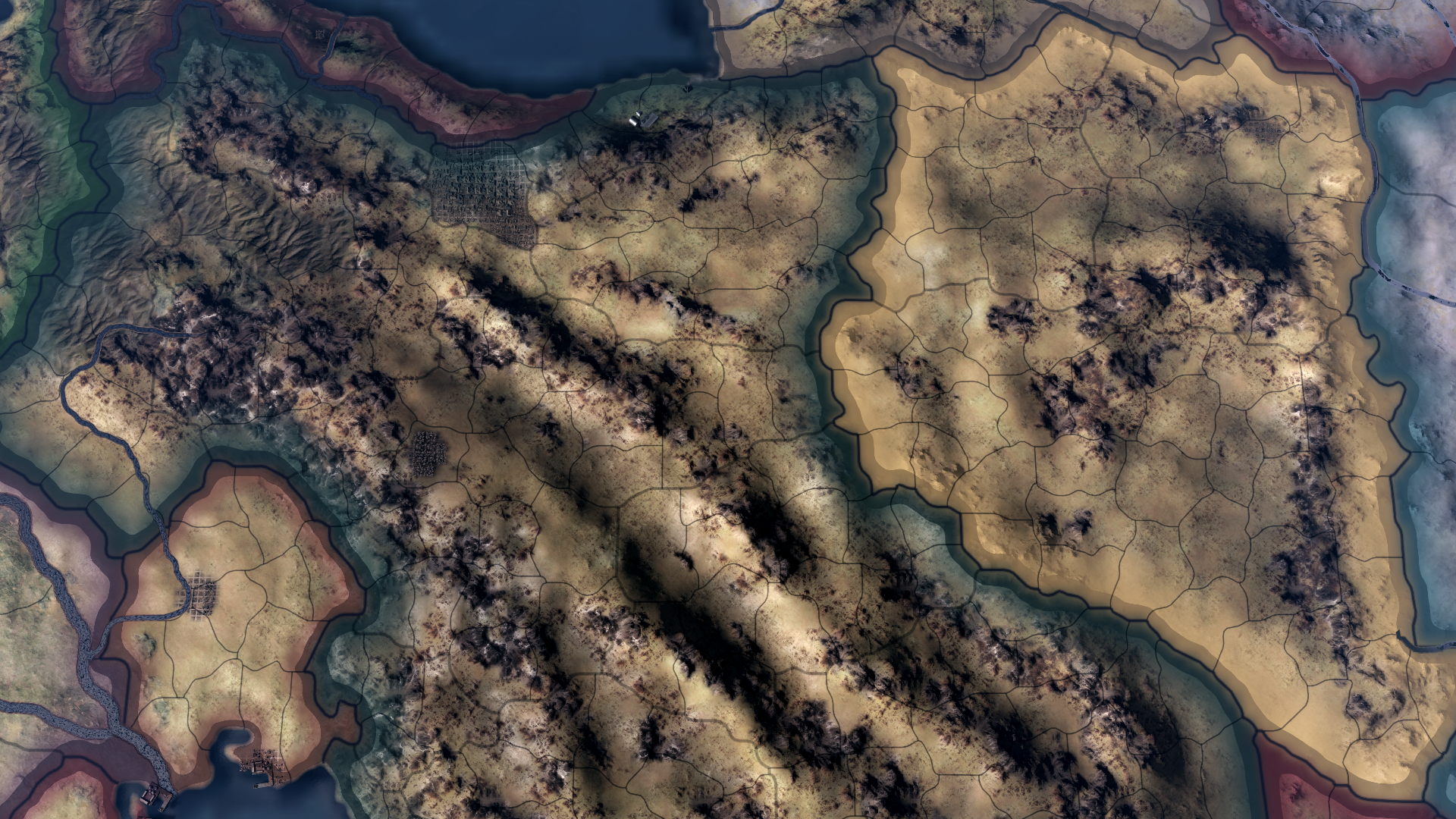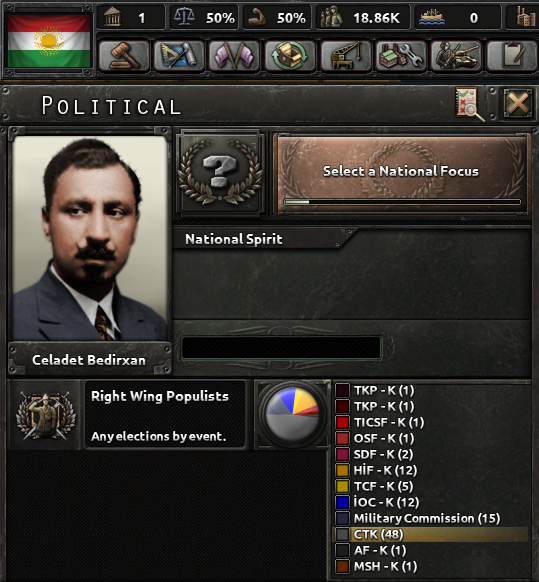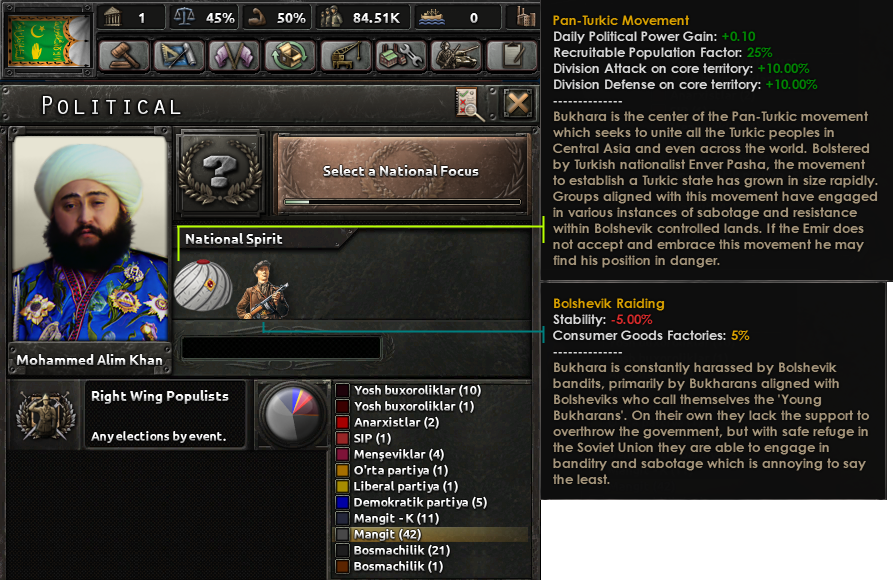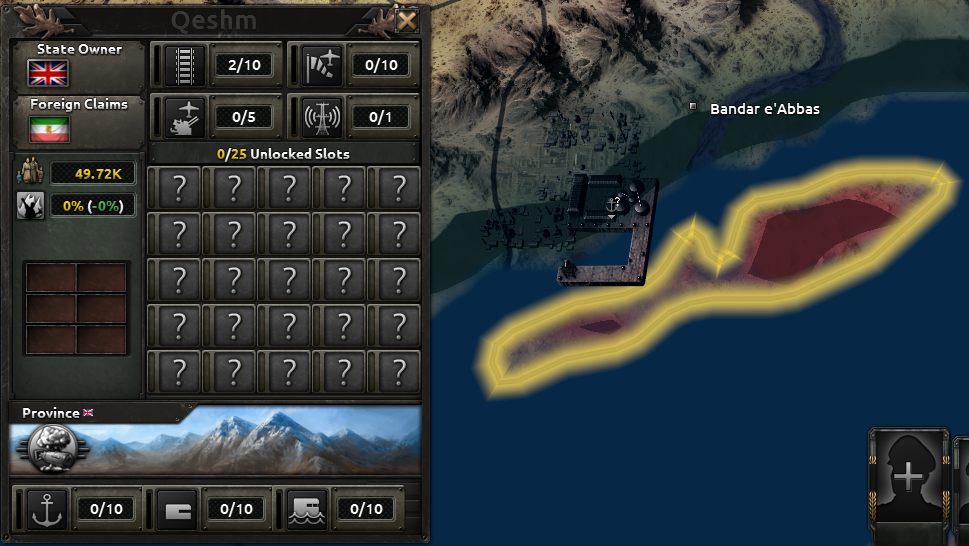Overview
Welcome to the fourth Progress Report. We are going to be trying something new with this PR with covering the overall development of an area on the map. In this case it is Persia. Please provide feedback on this format!
There has been a few small changes since the regional teaser a few days ago, but this is (for the most part) the final map of the Persia and the surrounding region.
Provinces:
Persia and the surrounding region has also received a major province and state rework to better fit the concept.
The Persian Breakaways
Fars (Qajar Persia)
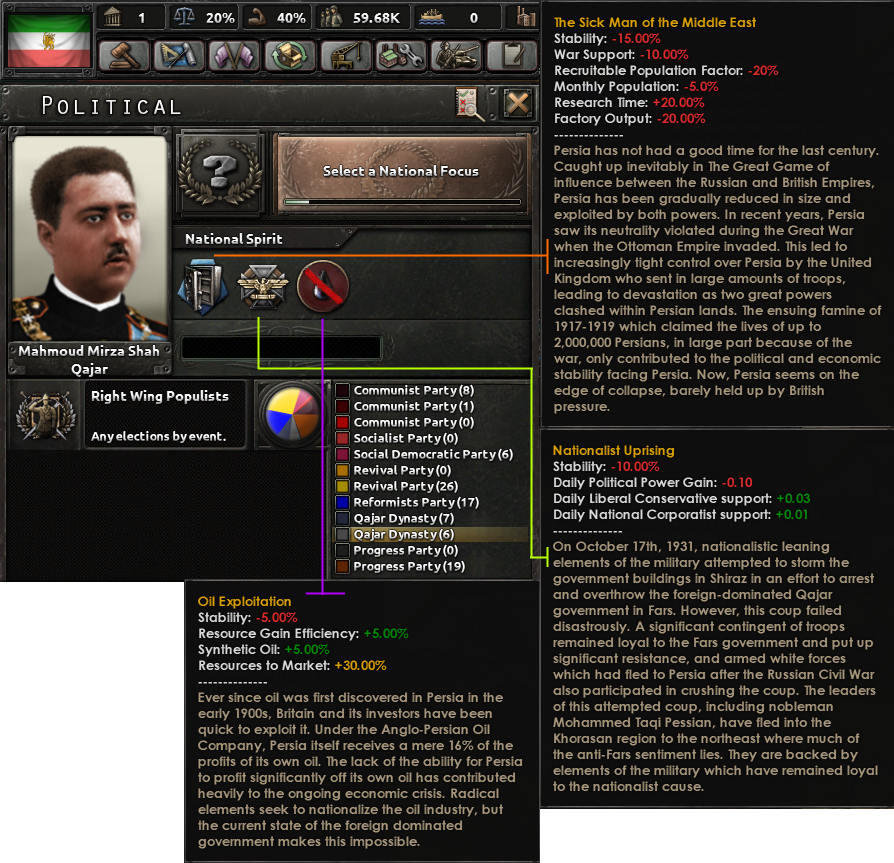
The Fars government, officially known as the Sublime State of Persia, is the largest and most widely recognized government in Persia.
It is ruled, de jure, by the Qajar dynasty, though the power of the dynasty over Persian politics has gradually been diminished since the Persian Constitutional Revolution in 1906, and even more so since the implementation of the Franco-British-White Russian regime following the Great War. In 1932, the power of the Shah, Mahmoud Mirza, is purely rubber stamp, and the unpopularity of the Qajar dynasty has left the Fars government as a republic all but in name.
Qajar Persia is primarily known as the Fars government because much of the politics of the government revolves around the southern portion of the country, mainly in the Fars Province. Although Tehran is still under the control of the Fars government, all governance is done from Shiraz, the capital of Fars Province. This is due to a combination of primarily safety based factors, such as the proximity of the Gilan Soviet to Tehran as well as the ongoing nationalist revolt in Khorasan.
Though the Fars government is the largest, it faces multiple threats internal and external.
Gilan Soviet
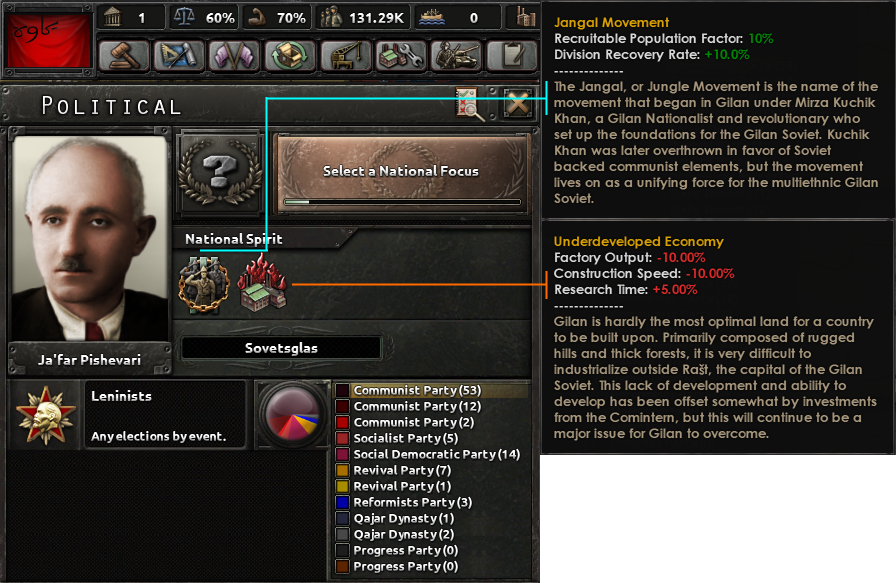
In our timeline, the Gilan Soviet was crushed when support from the RSFSR and aligned states was unable to continue due to pressure from imperialist powers at home. However, in Spartakus, the diversion of allied efforts to combat the German Red Army meant less pressure on the Russians, allowing the support for the workers in Gilan to continue. With the end of the Russian Civil War in 1922 the Fars government, recognising they would not be able to combat the Gilan Soviet any longer, signed an armistice ending combat with the region, though still claiming it as part of Iran. Despite this, during the fighting preceding the armistice, some of the Anglo-French forces assigned to protect the Ottoman Autonomous Region of Kurdistan moved in to seize the city of Tabriz from Gilan's control. The Premier of the Gilan Soviet is Ja’far Pishevari, an Azeri communist.
The Gilan Soviet remains keen on establishing itself as the legitimate government of Persia, with the ultimate goal of declaring the Persian Soviet Republic.
The ongoing instability in Fars could enable Gilan to move and seize Tehran. One such opportunity may arise in the event of a possible British invasion of Fars in order to bring it under full British control and combat both Gilani and Soviet interests in the area.
Backed by the Comintern with strong support from the Soviet Union, Gilan offers the primary long term threat to Fars, though the lack of development and population in regions under their control gives Fars a fighting chance.
Khorasan
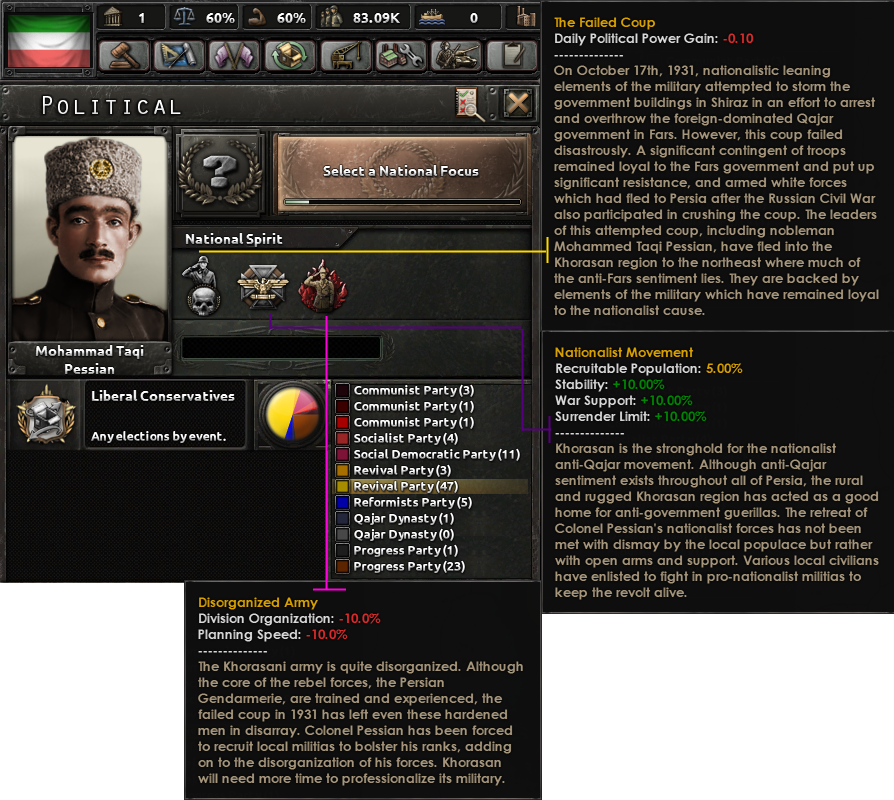
The Iranian Nationalist government of Khorasan is the other main opposition to the central government of Fars. Unrest due to the domination of Farsi politics by the British and White Russian remnants lead to the declaration of a new government, representing the Persian people rather than foreign interests. Having long outstayed its welcome following the failed reformist coup of 1931, it continues to sway the more “radical” reformist elements within Persia. It is widely believed to be held in much higher regards among the populace of Persia than the Fars government, but its popularity is spited by the lack of manpower and resources in the largely desertous area it is based in.
Khuzestan
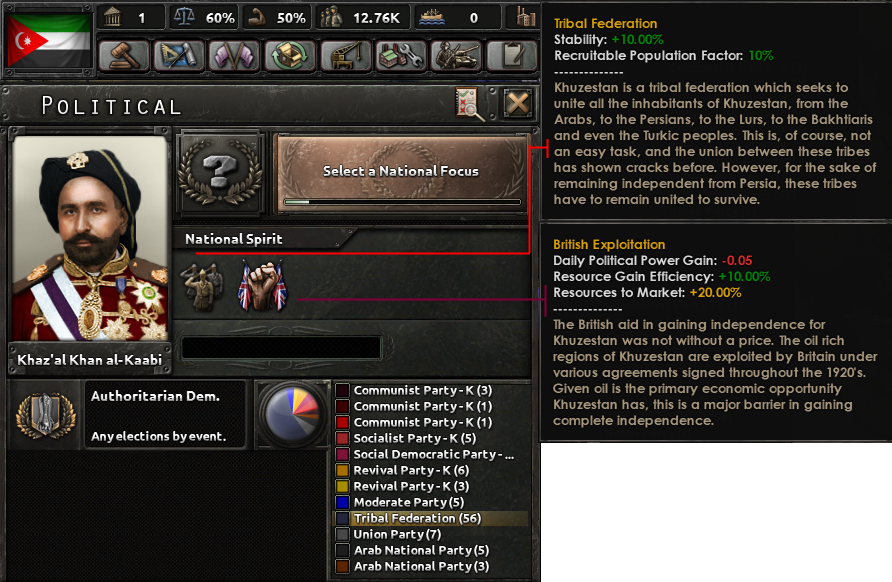
The formerly autonomous region of Khuzestan, the domain of Iranian Arabs, broke away from the Fars government, declaring independence in 1922. Though it is a tribal federation, it is dominated primarily by Arabs. It is unrecognized by Persia who still claims the oil rich region. Some have suggested a union between Iraq and Khuzestan to combat the threat of Persian invasion, though this is opposed by Britain who controls the Iraqi foreign policy. Though Khuzestan is currently backed by the British government, the relationship is fragile and Khuzestan will have to keep an eye on where British favoritism lies if it wants to survive.
Beyond Persia
Transcaspia
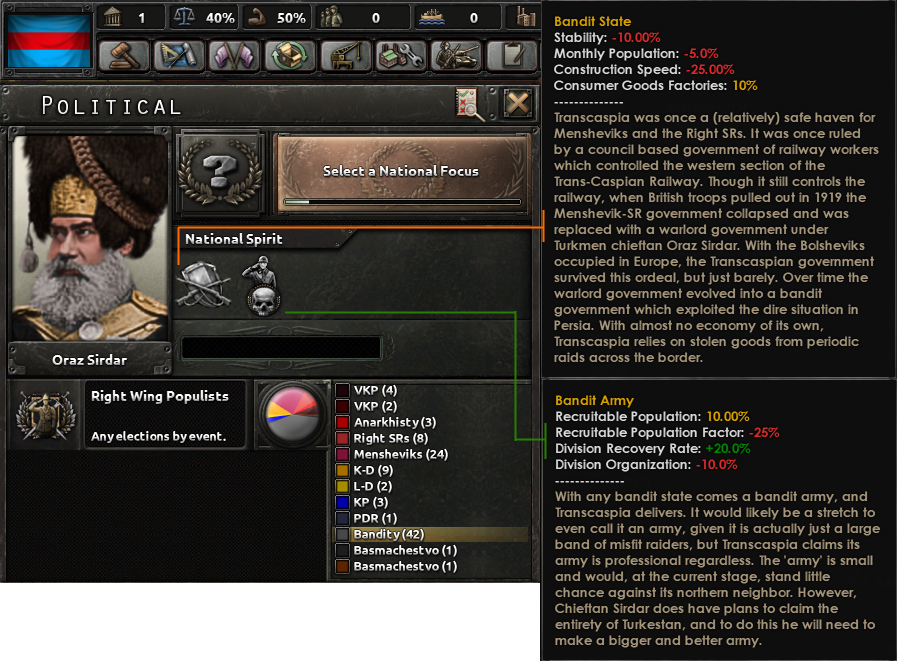
In July 1918 a Menshevik-Socialist Revolutionary coalition was set up by the Railway workers of the Trans-Caspian Railway, forming the Transcaspian Government.
General Wilfrid Malleson had been dispatched by the British Government to resist the Bolshevik forces, and assisted the Transcaspian Government by sending them a machine gun team across the border from India. This team stopped the Transcaspian forces being completely overrun by the Bolsheviks. The Transcaspian Government was largely in a weak position. It had no economy, and was existing on the money it had gained from the soviets when it took over. The main economy was based on cotton, however it had no means to export this, and so by December 1918 was on the brink of collapse, appealing to the British to send troops stabilising the area. While this worked for a time, when the British withdrew in 1919, the government crumbled instantly.
Yet with their much more pressing matters to attend to in Europe, the Bolshevik government in Moscow was unable to spare the attention to retake the area, leaving a power vacuum which by 1920 was filled by the Transcaspian Army, a military administration lead by influential general Oraz Sirdar. The bandits of Transcaspia harass the Caspian coastal regions of Persia, and amidst the crisis in Khorasan the provinces of Golestan and Northern Khorasan have effectively come under the control of the Sirdar regime. With multiple other more pressing issues, Fars is hardly capable of ending this banditry, though some have suggested the possibility of cooperation between the Farsi and the Transcaspians in an effort to bring down the rebellious opposition in Khorasan and legitimize Sirdar’s government, which aims to claim the entire Turkestan region.
Kurdistan
The British, French and Ottoman backed Kurdistan has occupied much of the Persian ethnically Kurdish lands. Anglo-French troops also occupied the Tabriz area and land around Lake Urmia to deny the region to the Gilan Soviet, ultimately assigning it as an autonomous zone of Kurdistan due to the small Kurdish minority. This hasn’t been without a cost, as Gilan backed insurgents regularly harass the residing Anglo-Kurdish forces. Additionally, Kurdistan is claimed by the Kingdom of Iraq, a British satellite, and these competing spheres could mean these lands falling back into the hands of Fars or even the Gilan Soviet.
Bukhara
Bukhara is a small but populated Emirate in southern Central Asia, bordering Afghanistan. It was established in 1747 by the current Manghit dynasty, which is descended from the Mongols. After losing a war to the Russian Empire in 1868, it was turned into a protectorate and lost much of its territory in 1873. However, the Russian Civil War in 1917 radically changed the situation, and Bukhara found itself without an overlord again.
Despite this, reformists calling themselves the “Young Bukharans” nonetheless attempted to overthrow the Emir, Mohammed Alim Khan, in favor of incorporation as a Soviet Republic. However, with the commencement of the German Civil War, late civil war efforts from the Red Army became almost exclusively focused on aiding Germany and containing Japan and as a result Bukhara was spared from invasion.
An attempt by the Young Bukharans to overthrow the Emir failed disastrously in 1922 with the help of Turkish nationalist Enver Pasha, who had moved to Bukhara after the Great War to promote the pan-Turkic Basmachi movement. Pasha still leads that bloc alongside tribal leaders like Ibrahim Bek, and this has resulted in significant pressure on the Emir to claim the entirety of Turkestan. The Young Bukharans were sent into exile into the USSR and have engaged only in banditry and low level sabotage in recent years.
British Baluchistan & Hormuz
In the south and southeast, Persia’s oil rich regions are exploited by the United Kingdom, who has fully occupied the Sīstān province under the puppet government of British Baluchistan, as well as directly seizing the strategic islands of Qeshm and Hormuz. These exploits have brought Anglo-Persian relations to an all time low and some speak of war.
Conclusion
Thanks for reading! As asked earlier, please provide feedback on this new PR model so we know whether we should do more like these in the future.
Remember to join the Discord, as many teasers are posted on there daily. Feel free to ask questions on there as well. Discord.gg
Also, if you are interested in joining the Dev Team, please remember all you need to do is fill out this form: Goo.gl
